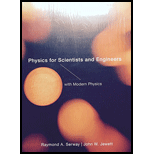
Concept explainers
(a)
The speed with which the water leaves the faucet.
(a)
Answer to Problem 80AP
The speed with which the water leaves the faucet is
Explanation of Solution
Given that the diameter of the faucet tap is
The flow rate of water through the pipe is always a constant. Write the expression for the volume flow rate of the water.
Here,
Write the expression for the flow rate in terms of area of the pipe.
Here,
Equate the right hand sides of equations (I) and (II).
Write the expression for the cross sectional area of the faucet tap in terms of its diameter.
Here,
Use equation (IV) in (III) and solve for
Conclusion:
Substitute
Therefore, the speed with which the water leaves the faucet is
(b)
The gauge pressure in the main pipe.
(b)
Answer to Problem 80AP
The gauge pressure in the main pipe is
Explanation of Solution
Given that the diameter of the faucet tap is
Consider two points 1 and 2 such that point 1 is in the entrance pipe and point 2 is in the faucet tap.
Write the continuity equation for the flow of water through points 1 and 2.
Here,
Rewrite equation (VI) in terms of the diameters of the pipes and solve for
Write Bernaulli’s equation for the give flow.
Here,
Since,
Conclusion:
Substitute
Substitute
Therefore, the gauge pressure in the main pipe is
Want to see more full solutions like this?
Chapter 14 Solutions
Physics For Scientists And Engineers With Modern Physics, 9th Edition, The Ohio State University
- 3. If the force of gravity stopped acting on the planets in our solar system, what would happen? a) They would spiral slowly towards the sun. b) They would continue in straight lines tangent to their orbits. c) They would continue to orbit the sun. d) They would fly straight away from the sun. e) They would spiral slowly away from the sun. 4. 1 The free-body diagram of a wagon being pulled along a horizontal surface is best represented by A F N B C 0 Ꭰ FN E a) A b) B c) C app app The app 10 app d) e) ס ח D E 10 apparrow_forwardPls help ASAParrow_forwardPls help asaparrow_forward
- Pls help asaparrow_forwardThe acceleration of an object sliding along a frictionless ramp is inclined at an angle 0 is 9. a) g tano b) g cose c) g sino 10. d) g e) zero A 1.5 kg cart is pulled with a force of 7.3 N at an angle of 40° above the horizontal. If a kinetic friction force of 3.2 N acts against the motion, the cart's acceleration along the horizontal surface will be a) 5.0 m/s² b) 1.6 m/s² c) 2.4 m/s² 11. d) 1.0 m/s² e) 2.7 m/s² What is the net force acting on an object with a mass of 10 kg moving at a constant velocity of 10 m/s [North]? a) 100 N [North] b) 100 N [South] 10 N [North} d) 10 N [South] e) None of these.arrow_forwardModified True/False - indicate whether the sentence or statement is true or false. If the statement is false, correct the statement to make it true. 12. An object in uniform circular motion has a constant velocity while experiencing centripetal acceleration. 13. An object travelling in uniform circular motion experiences an outward centrifugal force that tends to pull the object out of the circular path. 14. An object with less inertia can resist changes in motion more than an object with more inertia. 15. For an object sliding on a horizontal surface with a horizontal applied force, the frictional force will always increase as the applied force increases.arrow_forward
- Pls help asaparrow_forwardAnswer the given question showing step by step by and all necessary working out.arrow_forward1. The piston in the figure has a mass of 0.5 kg. The infinitely long cylinder is pushed upward at a constant velocity. The diameters of the cylinder and piston are 10 cm and 9 cm, respectively, and there is oil between them with v = 10⁻⁴ m^2/s and γ = 8,000 N/m³. At what speed must the cylinder ascend for the piston to remain at rest?arrow_forward
 Principles of Physics: A Calculus-Based TextPhysicsISBN:9781133104261Author:Raymond A. Serway, John W. JewettPublisher:Cengage Learning
Principles of Physics: A Calculus-Based TextPhysicsISBN:9781133104261Author:Raymond A. Serway, John W. JewettPublisher:Cengage Learning College PhysicsPhysicsISBN:9781938168000Author:Paul Peter Urone, Roger HinrichsPublisher:OpenStax College
College PhysicsPhysicsISBN:9781938168000Author:Paul Peter Urone, Roger HinrichsPublisher:OpenStax College Physics for Scientists and Engineers: Foundations...PhysicsISBN:9781133939146Author:Katz, Debora M.Publisher:Cengage Learning
Physics for Scientists and Engineers: Foundations...PhysicsISBN:9781133939146Author:Katz, Debora M.Publisher:Cengage Learning Physics for Scientists and Engineers, Technology ...PhysicsISBN:9781305116399Author:Raymond A. Serway, John W. JewettPublisher:Cengage Learning
Physics for Scientists and Engineers, Technology ...PhysicsISBN:9781305116399Author:Raymond A. Serway, John W. JewettPublisher:Cengage Learning University Physics Volume 1PhysicsISBN:9781938168277Author:William Moebs, Samuel J. Ling, Jeff SannyPublisher:OpenStax - Rice University
University Physics Volume 1PhysicsISBN:9781938168277Author:William Moebs, Samuel J. Ling, Jeff SannyPublisher:OpenStax - Rice University Physics for Scientists and EngineersPhysicsISBN:9781337553278Author:Raymond A. Serway, John W. JewettPublisher:Cengage Learning
Physics for Scientists and EngineersPhysicsISBN:9781337553278Author:Raymond A. Serway, John W. JewettPublisher:Cengage Learning





